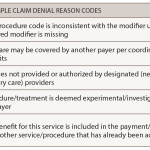“Prior authorization is the single most detrimental factor to patient therapy because it can delay treatment initiation and/or continuity of care, which in turn may negatively impact patient outcomes,” says Georgia Bonney, CMPM, CRMS, CRHC, practice manager for Virginia Rheumatology Clinic, Chesapeake. “In a system where we are striving to reduce disease activity and payers want us to focus on quality metrics to prove our worth, the prior authorization process can feel like a detour to failure.”

Ms. Bonney
Prior authorization is part of a broader set of cost control measures (e.g., step therapy, forced switching, restrictive formularies, specialty tiers, and substitution of biosimilars or generic drugs) implemented by payers, pharmacy benefit managers (PBMs) or other agents engaged to manage healthcare benefits, says Christopher Phillips, MD, a rheumatologist in solo practice in Paducah, Ky., and chair of the Insurance Subcommittee to the ACR’s Committee on Rheumatologic Care. The rationale is to prevent wasteful healthcare spending, but in reality prior authorization often serves as a delaying tactic, making patients and doctors jump through hoops before needed drugs are approved.

Dr. Phillips
“We’ve been subjected to prior authorization for years, but it has become increasingly more burdensome,” says Dr. Phillips.
Early in the COVID-19 pandemic, some insurers suspended prior authorization requirements. But now it’s back to business as usual, and with increasing access to nonemergent medical care, insurers are raising new obstacles to try to limit their financial exposure.
“In the field of rheumatology, it’s possibly even more burdensome than for other medical specialties,” says Dr. Phillips. “Not surprisingly, all of our newer, more expensive drugs need prior authorization. But in our office, we’ve seen that even generic NSAIDs [non-steroidal anti-inflammatory drugs], methotrexate or prednisone might require a prior authorization.”
Dr. Phillips’ practice, like many others, employs the equivalent of a full-time staff person dedicated just to working through prior authorization and similar reviews for prescribed drugs. Most often, these drugs eventually get approved, but that can take weeks or, occasionally, months. “Three months later,” he says, “we see the patient again, assuming they’ve been taking the medication we ordered all that time, and find out they weren’t getting it.”
Impact on Practices
In a 2018 AMA survey of 1,000 physicians, three-quarters of respondents reported that prior authorization hassles can lead to patients abandoning treatments and 91% said it has delayed their patients’ access to care.1 They also reported their prior authorization burden had increased over the previous five years.


